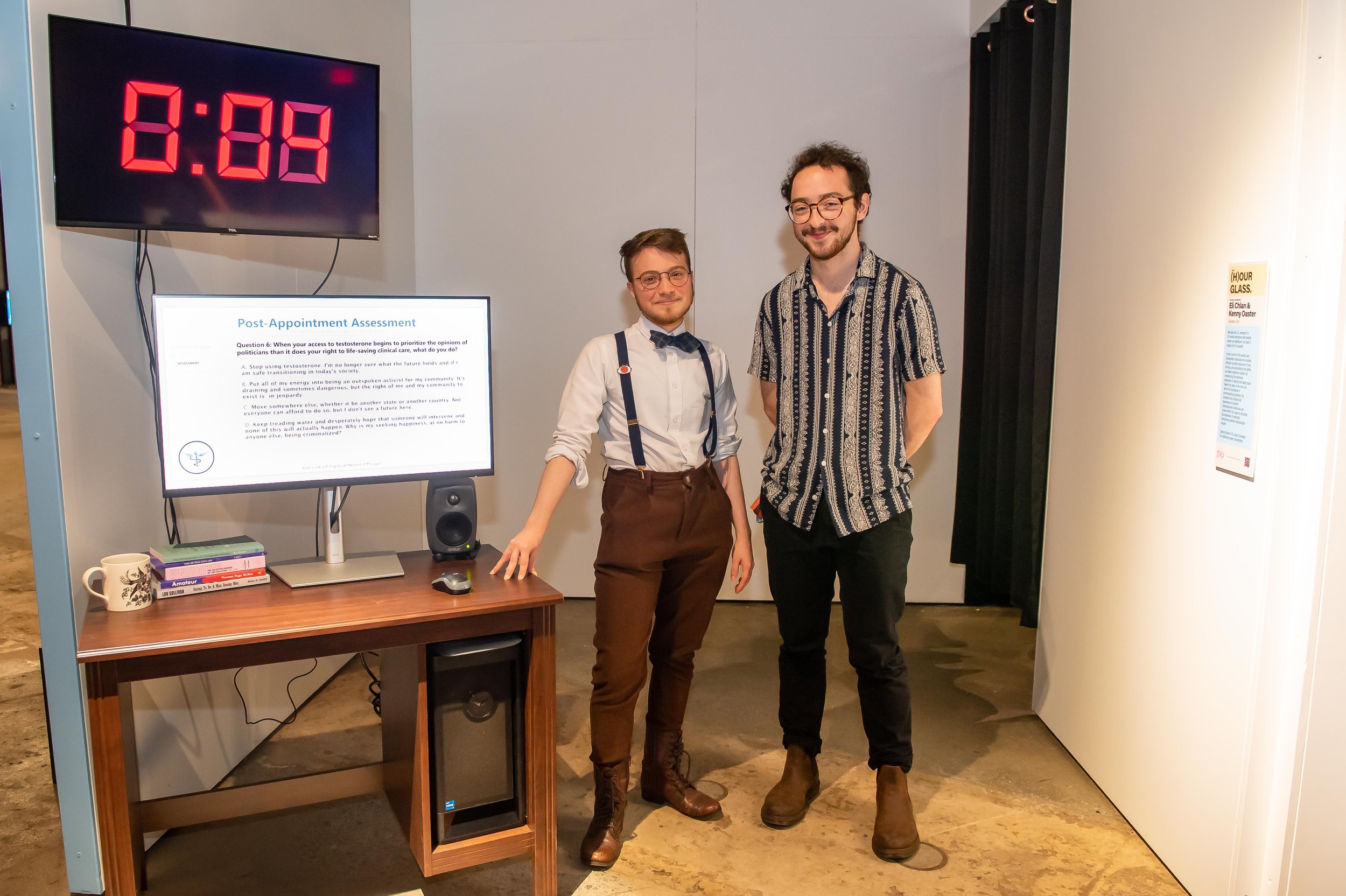(H)ourglass by Eli Chlan and Kenny Oaster
The work captures the experiences of anxiety, stress, and confusion of transmasculine people accessing transition-based healthcare
Eli Chlan and Kenny Oaster, the co-creators of (H)our Glass in Science Gallery Atlanta’s JUSTICE (Bita Honarvar, 2023)
When Eli Chlan first began imagining the art installation that would become (H)ourglass, all he saw were shattered mirrors, and all he felt was rage.
“I was angry,” Chlan says. “That was pretty obvious from my original sketches.”
A Ph.D. student in neuroscience at the Laney Graduate School of Arts and Sciences, Chlan wanted to develop an artistic representation of his experiences as a transmasculine person trying to access transition-based clinical care in the American healthcare system.
He wanted to create a work of art to help others experience the same anxiety, stress, and confusion he had endured behind clinic doors. As he originally designed, the piece reflected the trauma of that healthcare journey, depicting broken mirrors and evoking frustration and fear.
Then something unexpected happened. The creative process collided with the power of community.
“Kenny started incorporating the stories of other transmasculine people from the South into the installation,” Chlan says, referring to his artistic collaborator and co-creator, Kenny Oaster, a local multimedia artist. “All of a sudden, when I heard those stories, anger wasn’t the only emotion I wanted to convey anymore.”
Hope was in the mix now, also. And community.
“We’re at a critical point where access to transition-centered healthcare will shape how trans people can exist in the US”
The resulting installation, a complex, multi-tonal, interactive piece filled with emotional and empathic range, is on view now through September 30 at Science Gallery Atlanta. The subject of Science Gallery’s latest exhibition is JUSTICE, and Chlan and Oaster both believe their art speaks to this theme.
“Currently, over 500 anti-trans bills have been introduced just within the 2023 US legislative season alone, across 49 states,” Chlan says. “Access to transition-centered healthcare makes up over 30% of these bills. We exist at a critical point that will shape how trans people can exist in the United States moving forward.”
With ignorance and misinformation lying at the heart of much anti-trans legislation, Chlan and Oaster have created an installation that seeks to educate visitors about the realities of transition-centered healthcare in the US today. The aim is to build empathy and understanding across social and cultural divides.
“That's what we're looking to address through our piece,” Chlan says. “That connection, that empathy.”
Eli Chlan and Kenny Oaster during the launch event of Science Gallery Atlanta’s JUSTICE (Bita Honarvar, 2023)
(H)ourglass mimics the intake experience of a trans patient seeking clinical guidance for hormone replacement therapy. The immersive installation combines visual, audio, and narrative experiences to help visitors feel the dread, anxiety, information overload, and bias that trans people often experience when they walk into a clinic. After a patient visit simulation, gallery goers take a quiz to test how well they’ve absorbed all the information the physician has thrown at them. The exhibit then takes visitors into a room of mirrors, where they can see multiple versions of themselves and hear audio recordings of trans people sharing their stories.
Oaster, who oversaw the interviews for (H)ourglass and who stood by Chlan as a friend and ally during Chlan’s own transition experience several years ago, says he hopes the installation casts light on gaps and flaws within our current healthcare system. But he also hopes that the piece brings viewers hope. “We also wanted to celebrate the trans community,” he says.
To this end, Oaster was able to recruit his own healthcare provider, QMed (Queer Med), into the artistic effort. QMed’s mission is to address critical gaps in care by offering gender-affirming hormone therapy to the transgender and nonbinary community. A QMed physician plays the part of the doctor in the video portion of the interactive clinic simulation.
“We wanted to celebrate the trans community”
“The actor in that piece is actually my own physician,” Oaster says, “the same one I referred Eli to when he was frustrated with the care he was receiving elsewhere. It really is a project born out of community.”
Oaster and Chlan are passionate about wanting to make everyone feel welcome when they visit (H)ourglass. They have tried to create an experience that everyone can relate to, regardless of gender identity, politics, or level of understanding.
“It’s really an opportunity to engage with authentic stories of trans people, by trans people,” says Oaster.
And what better way to engage the public than through art? At last year’s Science Gallery Atlanta exhibition HOOKED, Chlan served as a mediator, helping to guide and educate visitors. Now, he is thrilled to have made the move to participating artist, and he says that Science Gallery embodies a commitment he shares.
“Hormone replacement therapy is not ‘just’ healthcare for trans people. It is life-saving care.”
“Good science needs good art,” he says. “Art allows us to access and understand scientific topics and content in ways that are relevant and emotionally tangible. They need each other.”
And with the number of anti-trans bills currently moving through the legislative halls of this country, increasing public understanding is needed now more than ever. Because with understanding, justice becomes possible.
“We want people to come away with the recognition that for trans people, hormone replacement therapy is not ‘just’ healthcare. It is life-saving care. It is that important,” says Chlan.


